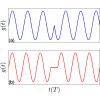当前位置:
X-MOL 学术
›
Phys. Rev. A
›
论文详情
Our official English website, www.x-mol.net, welcomes your
feedback! (Note: you will need to create a separate account there.)
Many-body echo
Physical Review A ( IF 2.6 ) Pub Date : 2020-07-08 , DOI: 10.1103/physreva.102.011301 Yang-Yang Chen , Pengfei Zhang , Wei Zheng , Zhigang Wu , Hui Zhai
Physical Review A ( IF 2.6 ) Pub Date : 2020-07-08 , DOI: 10.1103/physreva.102.011301 Yang-Yang Chen , Pengfei Zhang , Wei Zheng , Zhigang Wu , Hui Zhai

|
In this Rapid Communication, we propose a protocol to reverse a quantum many-body dynamic process. We name it “many-body echo” because the underlying physics is closely related to the spin echo effect in nuclear magnetic resonance systems. We consider a periodical modulation of the interaction strength in a weakly interacting Bose condensate, which resonantly excites quasiparticles from the condensate. A dramatic phenomenon is that, after pausing the interaction modulation for half a period and then continuing on with the same modulation, nearly all the excited quasiparticles in the resonance modes will be absorbed back into the condensate. During the intermediate half-period, the free evolution introduces a phase, which plays a role reminiscent of that played by the pulse in the spin echo. Comparing our protocol with another one implemented by the Chicago group in a recent experiment, we find that ours is more effective at reversing the many-body process. The difference between these two schemes manifests the physical effect of the micromotion in the Floquet theory.
中文翻译:

多体回声
在此快速通信中,我们提出了一种逆转量子多体动力学过程的协议。我们将其命名为“多体回波”,因为其基本物理原理与核磁共振系统中的自旋回波效应密切相关。我们考虑在弱相互作用的Bose冷凝物中对相互作用强度的周期性调节,该共振会共振地激发冷凝物中的准粒子。一个引人注目的现象是,在将相互作用调制暂停半个周期,然后继续进行相同的调制之后,几乎所有共振模式下的激发准粒子都将被吸收回冷凝物中。在中间半期,自由进化引入了 阶段,其作用让人想起 自旋回波中的脉冲。将我们的方案与芝加哥小组在最近的实验中实施的另一方案进行比较,我们发现我们的方案在逆转多体过程方面更为有效。这两种方案之间的差异体现了Floquet理论中微运动的物理效应。
更新日期:2020-07-08
中文翻译:

多体回声
在此快速通信中,我们提出了一种逆转量子多体动力学过程的协议。我们将其命名为“多体回波”,因为其基本物理原理与核磁共振系统中的自旋回波效应密切相关。我们考虑在弱相互作用的Bose冷凝物中对相互作用强度的周期性调节,该共振会共振地激发冷凝物中的准粒子。一个引人注目的现象是,在将相互作用调制暂停半个周期,然后继续进行相同的调制之后,几乎所有共振模式下的激发准粒子都将被吸收回冷凝物中。在中间半期,自由进化引入了 阶段,其作用让人想起 自旋回波中的脉冲。将我们的方案与芝加哥小组在最近的实验中实施的另一方案进行比较,我们发现我们的方案在逆转多体过程方面更为有效。这两种方案之间的差异体现了Floquet理论中微运动的物理效应。











































 京公网安备 11010802027423号
京公网安备 11010802027423号